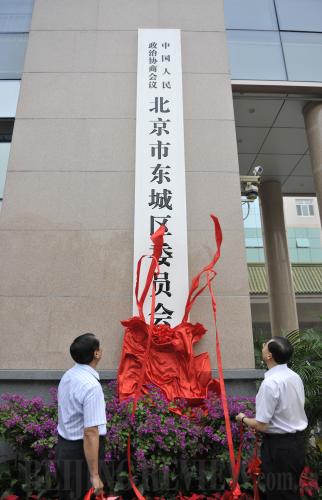|
 |
|
A NEW BEGINNING: Workers unveil the nameplate of the Committee of the Chinese People's Political Consultative Conference of new Dongcheng District of Beijing on September 15, 2010 (CFP) |
Balanced development
The establishment of new Dongcheng and Xicheng districts last year is the largest change in Beijing's administrative divisions since 1986.
The new Dongcheng District, composed of the original Dongcheng and Chongwen districts, has an area of 41.84 square km and a permanent population of 865,000. The new Xicheng District incorporates the original Xicheng and Xuanwu districts and covers 50.7 square km, with about 1.25 million residents.
A report of the Xinhua News Agency said the relatively limited geographical area of the original four districts had restrained their development. As an added benefit, merging the economically weaker southern districts, Chongwen and Xuanwu, with their northern neighbors is expected to make Beijing's growth more even.
For example, the original Xicheng District is home to hundreds of financial institutions, including multinational banks, insurance companies and securities firms. Clustered on the well-known Financial Street, these firms generate more than 100 billion yuan ($15.65 billion) in revenue for the district annually. While Xicheng District has experienced rapid growth, its southern neighbor, Xuanwu District, has seen comparatively little investment. In order to change the situation, the government of new Xicheng District is making detailed plans to expand the Financial Street to the south.
"The merger is also conducive to optimizing social resources and providing more opportunities for the further development of southern areas of downtown Beijing," said Song Yingchang, a professor of urban development and environmental research at the Chinese Academy of Social Sciences.
Before the merger, Xuanwu and Chongwen districts' educational resources were relatively weak. They had only a few high-quality high schools. Xicheng and Dongcheng districts, on the other hand, boast many outstanding high schools.
Current regulations, however, stipulate teenagers should only be admitted to schools in the same district where their residency is registered.
"The consolidation is good news for those school-age children in the original Xuanwu and Chongwen districts because they can freely choose good schools in the territories of new Xicheng and Dongcheng districts," Song said.
"Meanwhile, the merger will reduce administrative costs and improve efficiency by trimming the number of government institutions in the districts," said Wang Yukai, a professor with the Chinese Academy of Governance.
The State Council has demanded local authorities streamline governmental institutions, cut expenditures and improve administrative efficiency in the merged districts. This requirement suggests local government posts will be eliminated as the merger is consolidated.
"Though the posts for many civil servants will not immediately disappear, the prospects of their posts are not necessarily guaranteed in the long run," an anonymous official with the Organization Department of the CPC Beijing Municipal Committee told the Xinhua News Agency.
Heritage protection
The increasing adjustments of administrative divisions of cities have also raised concerns about the protection of historical sites in the areas.
The revoked Chongwen and Xuanwu districts in the south of Beijing, for example, had a number of invaluable cultural sites.
In ancient times, areas belonging to original Chongwen and Xuanwu districts were located outside the imperial inner city and were predominantly reserved for people from the lower classes. Therefore their historical sites reflect aspects of folk life in old Beijing.
But, before the merger in 2010, these districts lacked financial resources to protect these cultural sites by themselves, Song said.
Cheng Yongtao, Party chief of the Commission of Culture of new Dongcheng District, said protecting cultural heritage is one of the main targets of the merger.
"Historical sites will be better protected by the efforts of one larger district," he said. "The merger will speed up the renovation of Beijing's old city, almost all of which falls within the four districts involved in the merger, and make for the better protection of cultural sites."
In Shanghai, Yu Hai, a sociology professor at Fudan University, said he was worried that the culture of Luwan District might gradually disappear after its merger with Huangpu District.
"The new district authorities need to consider how to protect the culture of Luwan District after the merger," he said.
"Luwan District is significant because among all the districts and counties of Shanghai, it most represents the regional culture known as 'Haipai,' which refers to a cultural fusion of Western and Chinese elements," said Qian Nairong, a professor of liberal arts at Shanghai University.
"The history of Luwan District could be seen as a microcosm for modern Shanghai as it shows the city's development trajectory," Qian said.
But, Qian believes it really doesn't matter whether Luwan District's cultural heritage sites falls under the administration of one district or another.
"Cultural and historical sites are only meaningful when people remember the history behind them," Qian said. "Otherwise, they just become another commercial facility to entertain people." | 